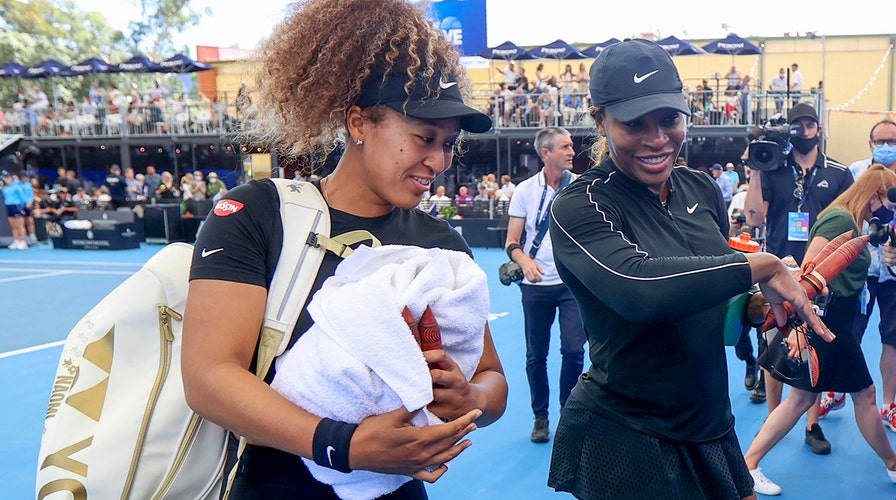Fox News Flash top headlines for September 7
Fox News Flash top headlines are here. Check out what's clicking on Foxnews.com.
Katrina Adams, the former USTA chair and president, spent the first 28 pages of her new leadership book/memoir, "Own the Arena" detailing the Naomi Osaka-Serena Williams debacle during the 2018 U.S. Open Finals.
Adams became part of the post-match controversy. The first chapter of "Own The Arena’’ shows how much it affected her life.
A former WTA doubles champion voted one of the "most powerful women in sports," Adams believes that September night three years ago still haunts Osaka, who was bounced from the Open on Friday in a display of racket-throwing and post-match press-conference tears.
CLICK HERE FOR MORE SPORTS COVERAGE ON FOXNEWS.COM
As she cried, Osaka said she’s taking a long break from the tour.
"As a human being, if I was in her position and that was the way I was welcomed in as a Grand Slam champion, it would impact me,’’ Adams told The Post before Monday’s book signing at the U.S. Open. "The booing wasn’t at her. But she didn’t know that as a 19-year-old. Your first impressions sometimes are everlasting ones. I felt bad for her that night.’’
During that championship ceremony, Adams presented the championship and runner-up trophies. The 20,000 fans rained down boos because of the perceived injustice that beset Williams in her wild tiff with linesman Carlos Ramos.
"It’s not the outcome we were looking for,’’ Adams stated in the beginning of her onstage remarks. Adams proceeded to commend Williams for still being a great champion. For days, Adams was viciously attacked on social media for taking sides.
Adams was compelled to do a series of national TV interviews explaining that her words were "misconstrued." She had meant to convey nobody hoped a finals match would be riddled with such ugly conflict.
"It was part of my story,’’ said Adams, who is doing color commentary for the U.S. Open’s world feed during the tournament. "The book is about me and what I’ve experienced and how tennis has helped me. That was a pivotal situation where I felt tennis helped me get through a very difficult moment.’’
In the book, Adams writes, "If I could do it all over again, would I have chosen my words more carefully? Absolutely.’’
According to the book, she made several attempts to let Osaka and her camp know she wasn’t "knocking her victory" and wasn’t "picking sides.’’
"I felt horrible ever since,’’ Adams wrote in her book.
Yes, watching Osaka melt down Friday also hurt Adams, who runs the Harlem Junior Tennis Education Program and attended Osaka’s Queens grand-opening event before the Open. Osaka had refurbished courts in her old Jamaica neighborhood and Adams had brought along her girls players for the clinic. They spoke with Osaka reminiscing about her Queens childhood, seeming at peace.
Who knew?
"I’m a player,’’ said Adams, who won 14 doubles titles. "You recognize when there are off-court issues that come onto the court. I don’t know what they are. You don’t know what’s on a player’s mind when they’re on the court. I feel really bad what she’s experiencing personally. Only she knows. Everyone else can speculate. I think she’s dealing with a lot. In my opinion she’s learning how to deal with that.’’
Nobody can predict when Osaka will return and if she’ll ever return to championship form. Osaka withdrew from the French Open and Wimbledon, citing mental-health issues. She could be heartened the 18-year-old who upset her, Leylah Fernandez, went on to beat her next foe, another former Open champion, Angelique Kerber.
"She only knows what she needs to do,’’ Adams said. "If that’s what she needs to get stronger, and healthy. It’s about getting healthy all around, mind, body, soul. We want to see her in the game a very long time.’’
CLICK HERE TO GET THE FOX NEWS APP
Adams, whose term with the USTA ended soon after the Open, says it was tough to watch Osaka "go mentally south’’ on court but commended her tear-filled openness afterward. Osaka could have easily went with clichés — congratulated Fernandez on a great performance and moved on. Instead Osaka bared her soul, bringing on more scrutiny.
"The world wants people to be authentic,’’ Adams said. "When they are, they bitch about it. I’m not in her camp but over time, she might start to curtail a little more.’’

